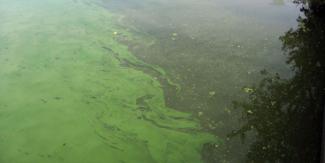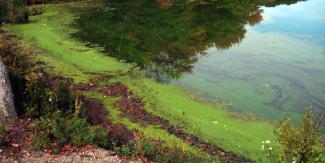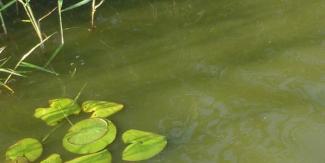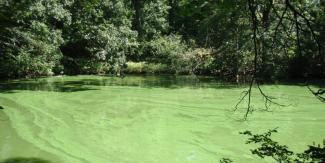Cyanobacteria (Blue-Green Algae)
New! RIDEM Freshwater Cyanobacteria Dashboard
Visit the interactive dashboard to view advisories, sample results and field monitoring data.
Cyanobacteria, also known as blue-green algae, are naturally found in many freshwater ecosystems. A combination of excess nutrients, sunlight, and high temperatures can lead to a rapid increase in cyanobacteria, called a “bloom.” Blooms of cyanobacteria generally occur in late summer into the early fall when water temperatures are warmest and an abundance of sunlight and nutrients are available. Some species of cyanobacteria can also produce toxins. These toxins are harmful to people and pets. There are no visual properties of a cyanobacteria bloom that indicate the algae are producing toxins. It is only possible to determine if toxins are present with laboratory tests. If a cyanobacteria bloom is observed, it is best to take caution and stay out of the water to avoid any potential exposure to toxins.
Cyanobacteria Monitoring
The Rhode Island Department of Health (RIDOH) and the Rhode Island Department of Environmental Management (RIDEM) work cooperatively to detect/respond to the presence of cyanobacteria blooms, evaluate the potential risks to the public, and, when necessary, issue health advisories notifying the public of health concerns. The agencies jointly issue health/recreational advisories when conditions indicate a cyanobacteria bloom poses a risk to public health.
2025 Advisories
Routine monitoring has ended for the 2025 season. Limited visits will be conducted during the remainder of 2025 to lift current advisories. Go to the interactive Freshwater Cyanobacteria Bloom Dashboard to view a list and map of current advisories, field data, and sample results. Click here for an explanation of how to use the dashboard.
What should you do if you encounter a bloom?
- Do not swim, play, or fish in water that appears to have a bloom.
- Do not let your pets swim or play in water experiencing a bloom.
- If you or your pet comes into contact with waters experiencing a bloom, wash with soap and water immediately.
- If you or your pet becomes ill after contact with waters experiencing a bloom, contact your health professional and/or veterinarian. After receiving treatment, report human illness to the Rhode Island Department of Health. Report dog/animal illness to RIDEM State Veterinarian Dr. Scott Marshall at (401) 537-4281, or scott.marshall@dem.ri.gov.
- Report the bloom to RIDEM by emailing photos and water description to DEM.OWRCyano@dem.ri.gov.
Below is a list of all advisories that have been issued since the monitoring program began in 2011.
Cyanobacteria, also known as blue-green algae, are a type of microscopic photosynthetic organism classified as bacteria. “Photosynthetic” means that they produce energy using sunlight, similar to plants. “Microscopic” means that they are too small to see with the naked eye. Cyanobacteria are naturally found in fresh and saltwater ecosystems in Rhode Island and were some of the earliest organisms to exist on earth.
Under certain conditions, cyanobacteria can rapidly reproduce to form a “bloom.” A bloom is a dense, visible growth of cyanobacteria that may discolor the water, reduce water clarity, and form a scum. Blooms can occur year-round but are more common in freshwater during the late summer and fall. The exact conditions that trigger a bloom are not fully understood which makes it difficult to predict exactly when and where a bloom will occur. A combination of excess nutrients, sunlight, stagnant or not-flowing water, and warm water temperatures often lead to cyanobacteria blooms.
Cyanobacteria blooms often have the following characteristics:
- Blooms are usually bright green or blue in color but may also be red, brown, or yellow.
- Water may resemble pea soup or be cloudy with a green tint.
- A green foamy scum may form on the shoreline.
- It may appear as if paint has been spilled on the surface of the water.
- Green streaks and swirling may cover the surface of the water.
Click Here for a Visual Guide to Identifying Cyanobacteria Blooms.
Cyanobacteria blooms can, but do not always, produce toxins that are harmful to humans, pets, livestock, and wildlife.
People may come in contact with cyanotoxins via ingestion, skin contact, or inhalation of aerosolized cyanobacteria. Skin contact with cyanotoxins may cause rashes, blisters, hives, and eye/nose irritation. Common health effects associated with ingestion of water containing cyanotoxins include stomach upset, abdominal pain, nausea, diarrhea and vomiting.
Rarer health effects associated with ingestion include liver or kidney damage or toxicity of the nervous system, symptoms of which include fever, numbness or tingling around the mouth, numbness spreading to arms and hands, headache, dizziness, muscle soreness, muscle weakness, difficulty breathing, and paralysis. Children are especially at risk due to their tendency to swallow water while swimming.
Pets and livestock are also especially at risk to cyanotoxins due to their tendency to drink the water and/or lick their fur after swimming. There are documented cases worldwide of pets and livestock dying after exposure to cyanotoxins. Health effects of cyanotoxin exposure in animals include vomiting or diarrhea, salivation/drooling, weakness and staggering, difficulty breathing, convulsions, paralysis, and death. Prompt veterinary care should be sought if your pet or livestock are experiencing any of the symptoms above, especially after coming in contact with water that may have a bloom.
Not all cyanobacteria blooms produce cyanotoxins. It is impossible to tell if a bloom is producing cyanotoxins by looking at it- a laboratory analysis is necessary to determine toxin levels. It is therefore best to keep people and animals out of water that is discolored, cloudy, or has a scum.
The purpose of the cyanobacteria monitoring program is to detect the presence of freshwater cyanobacteria blooms, evaluate potential risks to the public, and when necessary, issue recreational/health advisories notifying the public of health concerns.
The program routinely monitors waterbodies with a known history of frequent cyanobacteria blooms on a biweekly basis from approximately June through September (as resources allow). The program also responds to reports about potential cyanobacteria blooms from the public. Most reports come in via the cyanobacteria bloom reporting email address, DEM.OWRCyano@dem.ri.gov.
RIDEM/RIDOH jointly issue a recreational/health advisory when any of the following 3 thresholds are met:
- Visual evidence of a pond-wide cyanobacteria bloom, shoreline scum, mat, or paint-like streaks.
- Cyanobacteria cell count exceeding 70,000 cells/mL.
- Toxin level (Total Microcystins) of lysed cells greater than or equal to 4 ppb (ug/L).
Advisories generally remain in place until the bloom is no longer visible and two successive and representative sampling rounds conducted at least one week apart confirm cell count and toxin levels below the threshold values listed above.
The advisories recommend that people, pets and livestock avoid all contact with the waterbody, including swimming, fishing, boating and kayaking, until the advisory is lifted. The advisories are guidance, and people can choose to recreate at their own risk while an advisory is in place.
If you come in contact with a bloom, rinse with freshwater and soap and dry off thoroughly as soon as possible. If you, your family, or your animals have symptoms after coming in contact with a bloom, contact your health care provider or veterinarian. After receiving treatment, report human illness to the Rhode Island Department of Health (RIDOH) at 401-222-2577 (Infectious Disease Office) or 401-222-7727 (Beach Program-Illness Complaints). Report dog/animal illness to RIDEM State Veterinarian Dr. Scott Marshall at 401-537-4281, or scott.marshall@dem.ri.gov.
You can report a suspected cyanobacteria bloom to the Rhode Island Department of Environmental Management (RIDEM) by emailing DEM.OWRCyano@dem.ri.gov. Send pictures if you can, include the name of the waterbody, the location of the bloom, and a description of the suspected bloom.
There are multiple environmental factors that contribute to the formation of cyanobacteria blooms. Cyanobacteria naturally make up the phytoplankton community in most fresh waterbodies and are normally present in low numbers. Excess nutrient input, warm weather and sunlight, and stagnant or slow-moving water help cyanobacteria grow rapidly and produce a bloom.
While the environmental conditions listed above often correlate with cyanobacteria blooms, a complex interaction of physical, biological, and chemical parameters contribute to the formation or a bloom and the exact conditions that trigger a bloom are not always fully understood. More information about the factors that contribute to cyanobacteria blooms are listed below:
Excess Nutrients
Phosphorus and nitrogen are nutrients that are essential for all living things and are naturally present in fresh waterbodies. Excess nutrient input from the surrounding watershed can lead to rapid, excessive growth of cyanobacteria, resulting in frequent blooms. Sources of excess nutrients in the surrounding watershed may include:
- Lawn fertilizer,
- Pet, wildlife (especially waterfowl) and livestock waste,
- Failing septic systems,
- Erosion and sediment,
- Stormwater runoff.
Excess nutrients, particularly phosphorus, are also often stored in the sediment at the bottom of lakes. Low oxygen conditions at depth encourage the release of sediment-bound phosphorus into the water column, which can further fuel cyanobacteria blooms.
Warm Weather and Sunlight
Cyanobacteria blooms occur more frequently in the summer when the water is warm and sunlight is abundant, however blooms may occur year-round. Cyanobacteria use sunlight to photosynthesize and grow, and their growth is optimal at warmer temperatures.
Slow moving or Stagnant Water
Nutrient levels and temperature can increase quickly in slow-moving or stagnant water, both of which are beneficial to the growth of cyanobacteria.
Strong Competitors
Cyanobacteria have been around for billions of years and often naturally out-compete green algae.
Frequent, recurring cyanobacteria blooms are difficult to manage. They are often (though not always) an indication that excess nutrients are entering the waterbody from the surrounding watershed. There are best management practices that homeowners can follow which can reduce the amount of nutrients entering the waterbody. These practices include reducing or eliminating the use of fertilizer on the lawn, picking up pet waste in your yard and in public spaces, avoiding feeding of waterfowl, keeping up with septic system maintenance, and promoting stormwater infiltration on your property. Additional information on how homeowners can reduce nutrient inputs is available on the Rhode Island Stormwater Solutions website.
People often inquire about treatment methods such as herbicides for cyanobacteria blooms. The RIDEM/RIDOH Cyanobacteria Monitoring Program does not provide chemical treatment for cyanobacteria blooms. Lake associations or other interested entities can pursue chemical treatment on their own if desired. It is important to note that application of herbicides or other in-lake treatments are a short-term fix that will not address the root cause of recurring cyanobacteria blooms. Chemical treatment of an active bloom can also cause cyanotoxins to be released so follow-up monitoring is important.
A permit is required from the RIDEM Department of Agriculture and Forest Environment prior to application of herbicides to ensure safe use of the chemicals.
Click Here for a Visual Guide to Identifying Cyanobacteria Blooms.
Cyanobacteria blooms often occur in freshwater during the summer and fall but can occur year-round. Cyanobacteria blooms may display the following properties:
- Blooms are usually bright green or blue in color but may also be red, brown, or yellow.
- Water may resemble pea soup or be cloudy with a green tint.
- A green scum may form on the shoreline.
- May appear as if paint has been spilled on the surface of the water.
- Green streaks and swirling may cover the surface of the water.
New! RIDEM Freshwater Cyanobacteria Dashboard
Visit the interactive dashboard to view advisories, sample data and field monitoring results. Click here for an explanation of how to use the dashboard.





